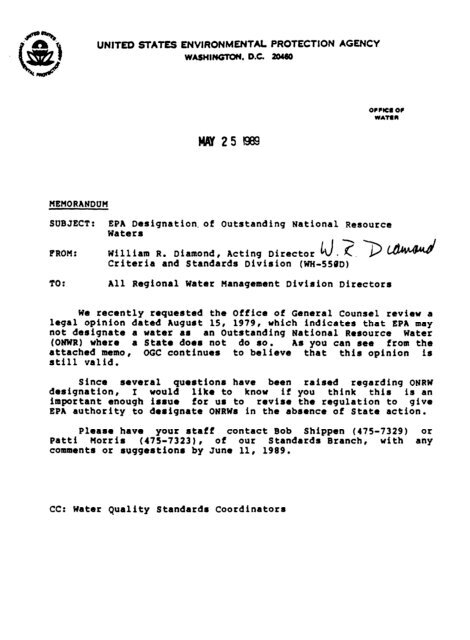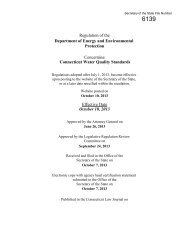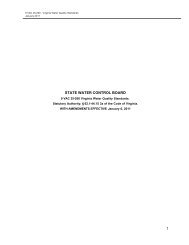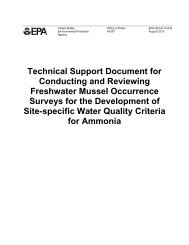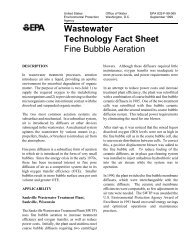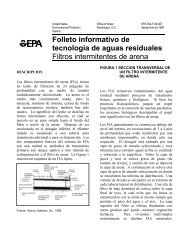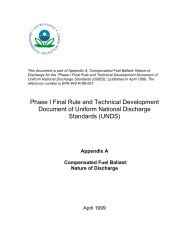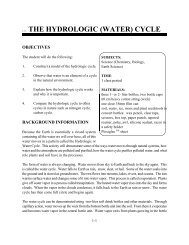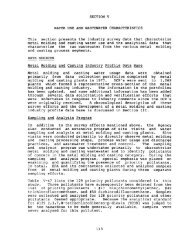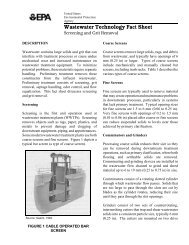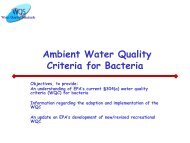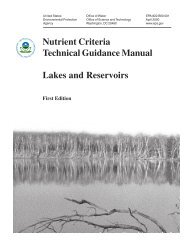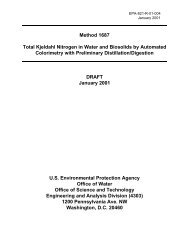EPA Designation of Outstanding National Resource Waters (PDF)
EPA Designation of Outstanding National Resource Waters (PDF)
EPA Designation of Outstanding National Resource Waters (PDF)
Create successful ePaper yourself
Turn your PDF publications into a flip-book with our unique Google optimized e-Paper software.
UNITED STATES ENVIRONMENTAL. PROTECTION AGENCY<br />
WASHINGTON. D.C. 20460<br />
OFFICE OF<br />
WATER<br />
MEMORANDUM<br />
SUBJECT : <strong>EPA</strong> <strong>Designation</strong> <strong>of</strong> <strong>Outstanding</strong> <strong>National</strong> <strong>Resource</strong><br />
<strong>Waters</strong><br />
FROM: William R. Diamond, Acting Director<br />
Criteria and Standards Division (WH-550D)<br />
TO: All Regional Water Management Division Directors<br />
We recently requested the Office <strong>of</strong> General Counsel review a<br />
legal opinion dated August 15, 1979, which indicates that <strong>EPA</strong> may<br />
not designate a water as an <strong>Outstanding</strong> <strong>National</strong> <strong>Resource</strong> Water<br />
(ONWR) where a State doer not do so. As you can see from the<br />
attached memo, OGC continues to believe that this opinion is<br />
still valid.<br />
Since several questions have been raised regarding ONRW<br />
designation, I would like to know if you think this is an<br />
important enough issue for us to revise the regulation to give<br />
<strong>EPA</strong> authority to designate ONRWs in the absence <strong>of</strong> State action.<br />
Please have your staff contact Bob Shippen (475-7329) or<br />
Patti Morris (475-7323), <strong>of</strong> our Standards Branch, with any<br />
comments or suggestions by June 11, 1989.<br />
CC: Water Quality Standards Coordinators
UNITED STATES ENVIRONMENTAL PROTECTION AGENCY<br />
WASHINGTON. D.C. 20460<br />
OFFICE OF<br />
GENERAL COUNSEL<br />
MEMORANDUM<br />
SUBJECT: <strong>EPA</strong> <strong>Designation</strong> <strong>of</strong> <strong>Outstanding</strong> <strong>National</strong><br />
<strong>Resource</strong> Water<br />
FROM: Catherine A. Winer<br />
Attorney, Water Division<br />
(LE-132W)<br />
TO: William Diamond, Director<br />
Criteria and Standards Division<br />
(WH-550D)<br />
You have asked us to review a legal opinion dated August 15,<br />
1979, which indicates that <strong>EPA</strong> nay not designate a water as an<br />
<strong>Outstanding</strong> <strong>National</strong> <strong>Resource</strong> Water (ONRW) where a state does<br />
not do so. For the reasons below, while some <strong>of</strong> the<br />
circumstances and documents upon which the 1979 opinion relied<br />
have changed, this <strong>of</strong>fice continues to believe that it would be<br />
quits legally risky for <strong>EPA</strong> to designate a water an ONRW.<br />
The 1979 memo reached its conclusion based on a number <strong>of</strong><br />
factors, including the lack <strong>of</strong> easily demonstrated statutory<br />
basis for <strong>EPA</strong>’s antidegradation policy, the lack <strong>of</strong> attention<br />
given the ONRW provision In the 1975 rulemaking compared to its<br />
potential impact, the lack <strong>of</strong> any explicit indication that <strong>EPA</strong><br />
intended designation to be mandatory, and the lack <strong>of</strong> guidance on<br />
which waters were to be designated ONRW.<br />
The 1987 amendments to the Clean Water Act have largely put<br />
to rest the question <strong>of</strong> the statutory basis for <strong>EPA</strong>’s<br />
antidegradation policy (although we have not yet had any court<br />
ruling on the subject). The question now is what <strong>EPA</strong>’s<br />
antidegradation policy means (or what a court would find we have<br />
reasonably put the public on notice that it means).
-2-<br />
The 1983 Water Quality Standards rulemaking gave more<br />
attention to the antidegradation policy, including the ONRW<br />
provision in particular, then did the 1975 rulemaking. For<br />
example, in 1983, unlike 1975, the preamble expressly discussed<br />
the "no degradation" requirement for ONRW’s and explained that<br />
<strong>EPA</strong> was modifying it slightly to allow minor, short-term impacts<br />
which did not interfere with the character <strong>of</strong> the ONRW. On the<br />
other hand, neither the revised regulation nor the preamble<br />
clearly states that states have a mandatory duty to designate<br />
eligible waters as ONRW's or that <strong>EPA</strong> will do so if they fail to<br />
do it. In fact, the explanation for why <strong>EPA</strong> modified the "no<br />
degradation" requirement strongly implies that states had some<br />
discretion in designating ONRW’s (preamble-indicated that states<br />
were deterred by the strictness <strong>of</strong> the "no degradation"<br />
requirement from designating waters which could be ONRW's).<br />
Moreover, although the 1983 preamble discusses briefly some<br />
criteria for what waters are appropriate for designation as<br />
ONRW’s, the regulation itself is unchanged from the 1975<br />
version in that regard.<br />
Although "Chapter 5", the applicable guidance <strong>of</strong> the 1970's,<br />
has been superseded by the WQS Handbook and by the Q&A's on<br />
Antidegradation, the new guidance does not give any indication<br />
that the designation process is mandatory or that <strong>EPA</strong> will step<br />
in if a state fails to act. Page 2-14 <strong>of</strong> the Handbook says that<br />
the change in level <strong>of</strong> protection for ONRW’s should "encourage"<br />
more states to make use <strong>of</strong> the designation; this strongly<br />
suggests that the designation process is voluntary. The Q&A's<br />
(#10) do not address the question <strong>of</strong> designation but rather only<br />
discuss the level <strong>of</strong> protection to be given ONRW's.<br />
In summary, neither the 1983 rulemaking nor the subsequent<br />
guidance indicates to the public (or to OGC) that <strong>EPA</strong> intended<br />
the ONRW designation one to be a mandatory one. Nor does the<br />
regulation clearly indicate the criteria for designation such<br />
that we could reliably defend a disapproval <strong>of</strong> a non-designation<br />
against a charge that we were being arbitrary and capricious.<br />
Since <strong>EPA</strong> is authorized to promulgate only where we find that a<br />
state standard does not meet the requirements <strong>of</strong> the act or that<br />
a new or revised standard is necessary to meet the requirements<br />
the act, I believe that, absent regulatory change, <strong>EPA</strong><br />
designation <strong>of</strong> an ONRW where a state failed to act would still be<br />
quite risky.
i.l(J c*;, Q<br />
.: fi3 :;<br />
-2-<br />
Additionally, no dcgrudstion shnll be<br />
allowed in high qua1 ity waters which<br />
constitute an outstanding <strong>National</strong><br />
resource; such as waters <strong>of</strong> <strong>National</strong> and<br />
State parks and wildlife refuges and<br />
waters <strong>of</strong> exceptionol;cccreational or<br />
ecological significance. 40 CFR<br />
35.1550(e)(2), third sentence.<br />
The preamble discussion accompanying <strong>EPA</strong>’s<br />
“ant idegradat ionn regulation contains only ..four sentences.<br />
40 FR 55336, November 28, 1975. There is absolutely no<br />
mention <strong>of</strong> ONRW’s or the “no degradation” idea. In fact,<br />
the preamble reader is ledTo believe the States may allow<br />
limited degradation <strong>of</strong> high quality waters for social and<br />
economic reasons:<br />
The policy provides for protection <strong>of</strong><br />
existing instream water uses and, for<br />
water whose Quality exceeds the nation<br />
water quality goals, Ehibits<br />
degradation except to alfow necessary<br />
ustifiable economic an social<br />
%iypment. 40 FR 55336, edmphasis<br />
la1<br />
The preamble suggests that States have a great den1 <strong>of</strong><br />
discretion in formulating the specifics <strong>of</strong> their<br />
antidegradation policies:<br />
The effect <strong>of</strong> including antidegradation<br />
requirements in these regulations is to<br />
require the States to review their<br />
current antidegradation policies and to<br />
establish a mechanism, including a<br />
public process, for implementing the<br />
State anti-degradation policies. 40 FR<br />
55336.<br />
The only other formal guidance on ONRW*s <strong>of</strong> which we<br />
are aware appears in the November 1976 Water Quality<br />
Standards (“Chapter 5”) Guidelines. The OHRW discussion<br />
appears at S5.4(C) (pages 5-14, S-15) and is quite brief.<br />
The Guidelines say that certain types <strong>of</strong> waters should be<br />
“considered” as ONRW’s, and that States $hould provide<br />
adequate notice on the “possible” designation <strong>of</strong> ONRW’s.<br />
The Guidelines “reconmend” thAt each State include a listing<br />
<strong>of</strong> ONRW’s in its water quality .standards.
-3-<br />
Discussion<br />
Question #I<br />
Especially because the Clean Water Act never mentions<br />
Oh?W’s,*/ we do not feel that <strong>EPA</strong> could under its current<br />
regulatTons demand any particular State ONn!V designations or<br />
designate OXRWts through the Federal promulgation process.<br />
We believe that the foregoing background shows that the only<br />
reasonable interpretation <strong>of</strong> our current regulations is that<br />
States should consider designating OINRW’S, but that they are<br />
free, after such a consideration, not to designate any.<br />
First, if we had been asserting the highly signffichnt<br />
Federal power to designate zones <strong>of</strong> no degradation in 1975,<br />
I! seezx incredibIe thAt our. prexIb!c Y3:r!If ~~,?tzia<br />
absolutely nothing on this point. As discussed above, the<br />
preamble not only failed to mention ONTW’s, but also<br />
stressed that degradation could be allowed for social and<br />
economic reasons (not the case for ON’R\V’s) and that “the<br />
ef feet” <strong>of</strong> our reg=tions would be to establish a mechanism<br />
for “implementing the State antidegradation policies.”<br />
Second, our current regulations <strong>of</strong>fer totally<br />
insufficient guidance as to which, if any, arens the States<br />
are to designate as ONRW’s. It seems obvious that <strong>EPA</strong> did<br />
not intend for all park waters to be designated, for the<br />
Guidelines say that park and other waters should be<br />
“consideredfr for ‘lpossiblel’ designation. Moreover, phrases<br />
such as “exceptional recreational or ecological<br />
significance” and “high quality waters” are highly<br />
subjective and virtually impossible to enforce without<br />
further regulatory guidance.<br />
Third, in its Chapter 5 Guidelines, <strong>EPA</strong> merely<br />
“recommended” that States include ONRW designations in their<br />
water qualf ty standards. This is in vivid contrast to other<br />
provisions in the Chapter 5 Guidelines, which stress the<br />
mandatory nature.<strong>of</strong> certain requirements. E.g., SSS.Z(A),<br />
5.2(B).<br />
In short, we ‘think the only fair interpretation <strong>of</strong><br />
current 40 CFR 35,1550(e) is that <strong>EPA</strong> has left the States<br />
complete discretion with respect to OMIV’s, including the<br />
*/ Because our regulations have made reference to ONRW’s<br />
Fince 1975, we are willing to assume for now thAt the Clean<br />
Water Act authorizes our regulations.
-4-<br />
discretion not to designate any at all. If <strong>EPA</strong> now demanded<br />
State ONRW designations under the threat <strong>of</strong> Federal ONUV<br />
promulgations, the legal screams from potentially affected<br />
p,~;it:;: could be deafening (and devastating in many<br />
. If <strong>EPA</strong> is to embark upon this highly significant<br />
new course, it must first amend ;i.ts regulations to make its<br />
intentions known clearly and expl’icitly.<br />
Question<br />
t2<br />
Assuming a State has adopted an OHRW, you ask if <strong>EPA</strong><br />
has authority to promulgate a water quality standard to<br />
protect the OmW’s status. We are not sure why an water<br />
quality standard would be necessary for an OXRW, + I nce the<br />
standard is no degradation; */ it would seem that arguments<br />
over x or LiiiTcrograrns per cubic meter would be<br />
i rzzlFvant. ?‘lhenever a new point SOUTCS ~~21 ied for a<br />
permit to discharge into an ONRW, we could simply deny the<br />
permit (or force the State to deny the permit through our<br />
veto power) under 5301(b)(l)(C), which requires compliance<br />
with all State laws.**/<br />
Assuming that it would be necessary to issue a water<br />
quality standard to protect an ONKW, however, we feel that<br />
<strong>EPA</strong> has such authority. Section 303(c)(4)‘(B) authorizes <strong>EPA</strong><br />
to promulgate such water quality standards as may be<br />
necessary to meet the requirements <strong>of</strong> the Act. lf a State<br />
has designated a water body as an ONRW, SS30l(b)(l)(C) and<br />
510 require that <strong>EPA</strong> honor such a designation and give it<br />
effect. If a new water quality standard is necessary to<br />
effectuate the designation, S303(c)(4)(R) would accordingly<br />
authorize <strong>EPA</strong> to promulgate the standard.<br />
*/ Unlrke the Air Act concept, which is no ffsfgniffcantn<br />
Teteriorat ion.<br />
**/ We are assuming that the State would designata rne ONRW<br />
through the regular processes <strong>of</strong> State law.


